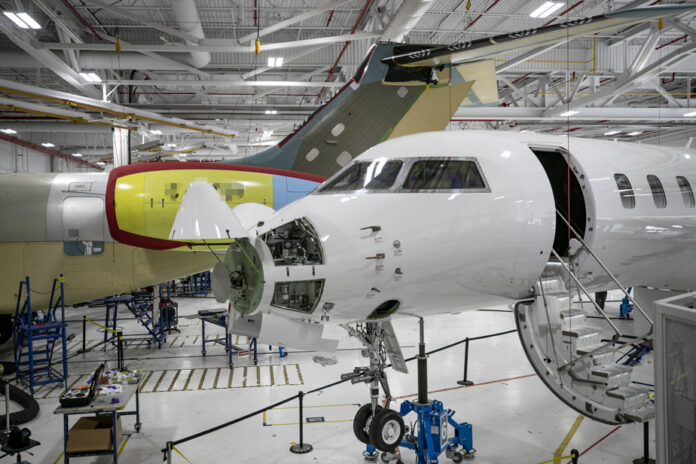Bombardier is doing better than its rivals by maintaining its delivery rate. His challenge: to accumulate orders to prevent the backlog from shrinking. This could be more complicated than expected when one of the aircraft manufacturer’s main customers is on the precipice.
VistaJet, which operates a fleet of around 360 private jets – including dozens of the Quebec manufacturer’s Global and Challenger families – is said to have lost around 435 million US dollars over the past four years and its debt totals 4.4 billion US dollars. This information comes from a report by the Financial Times, which got its hands on documents sent to the company’s creditors.
Its external auditor, Ernst
“We have no concerns,” Bombardier President and CEO Eric Martel said Thursday when asked about the subject during a conference call to discuss with media representatives. second quarter results. At this time, we have delivered all of our aircraft to VistaJet. »
However, this business remains important to Bombardier. The proof, the big boss of the operator, Thomas Flohr, had been welcomed with great fanfare in the aircraft manufacturer’s hangars in Montreal in March 2022 as part of a special event aimed at highlighting the 100th delivery of a Global 7500.
Asked about VistaJet’s situation, Mr. Martel was cautious in his comments, suggesting that the operator’s business model — selling blocks of hours — may have been misunderstood. But the situation in which the operator would find itself suggests that all is not well in business aviation, which has benefited greatly from the craze for private transport since the start of the COVID-19 pandemic. .
Furthermore, even though Bombardier delivered results relatively in line with expectations, investors seemed concerned about other elements, such as customer sentiment. On the Toronto Stock Exchange on Thursday afternoon, the stock fell 10%, or $6.65, to trade at $60.87.
After handing over 51 private jets to customers in the first six months of the year, Bombardier expects to deliver at least 87 more by the end of 2023 to reach its target of 138 aircraft.
At the same time, the Quebec multinational expects to post a ratio of new orders to the number of deliveries of 1.1 to maintain the value of its order book at around 15 billion US dollars. That means the company will have to rack up new contracts as more private jets roll out of its factories.
“We have put a lot of effort into the defense segment and we are seeing orders in the last two quarters,” Mr. Martel pointed out. We are not just talking about traditional clients (companies or wealthy individuals). There are also opportunities on the fleet operator side. »
For example, last week Airshare announced plans to purchase up to 20 Challengers. Flight hours logged by Bombardier-built planes posted a 51% increase in the second quarter compared to the same period before the health crisis, says Mr. Martel. Over one year, the increase is 14%.
According to Brian Foley, of the American firm Brian Foley Associates, between 25 and 30% of deliveries are made with operators, such as VistaJet, NetJets and Airshare, which rent aircraft at hourly rates generally above US$1,000 or offer seats in private jets.
“These operators are flying more than in 2019, but the activity is gradually decreasing, warns the analyst. These companies can delay or cancel deliveries, which can have an impact on manufacturers like Bombardier. »
Mr. Foley is also concerned about what lies ahead for VistaJet. If it downsizes, that means Bombardier planes would suddenly become available, which could affect orders for new private jets.
“Contracts are more flexible for operators compared to those concluded with individuals,” adds Frederic Larue, co-founder of the Montreal firm of consulting services and specialized financing for business aviation Echo Aviation. The agreements with VistaJet and the others, they are often important. They therefore have more flexibility. »
Along with analysts, Bombardier management was also questioned about the US 222 million taken from its cash, a higher amount than expected. This result is explained in particular by a non-recurring payment of 104 million US dollars to cover the residual value of commercial aircraft sold – the CRJs – in the past. The company says it’s the “last” installment of its kind.
Headquarters: Montreal
President and CEO: Eric Martel
Revenue (2022): $6.9 billion
Global headcount: 16,000 employees
Industries: Business Aviation, Maintenance Service and Defense















